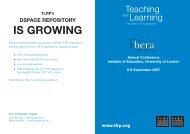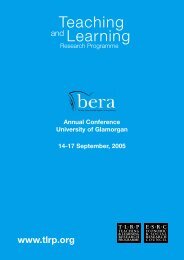12 COLLABORATIVE LEARNINGGETTY IMAGESHow <str<strong>on</strong>g>to</str<strong>on</strong>g> makegroups workSPRinG has developed six key points <str<strong>on</strong>g>to</str<strong>on</strong>g><str<strong>on</strong>g>guide</str<strong>on</strong>g> the planning of group-work1The classroom andgroups should bec<strong>on</strong>structed strategicallyand flexibly.The classroom should bearranged <str<strong>on</strong>g>to</str<strong>on</strong>g> allow groupworkas well as individualand whole class work.the number of groupsThese should maximiseeffective interacti<strong>on</strong>between pupils as well aswith the teacher. Balancebetween the size and thenumber of the groups isimportant – butchallenging! Lots of smallgroups or pairs may workwell over short time periodswith a deadline (e.g. around5 minutes). A few largegroups lead <str<strong>on</strong>g>to</str<strong>on</strong>g> higherpotential for pupildistracti<strong>on</strong> and disrupti<strong>on</strong>.Flexibility is needed.group sizeIt is important <str<strong>on</strong>g>to</str<strong>on</strong>g> make thesize of groups relevant <str<strong>on</strong>g>to</str<strong>on</strong>g> thetask at hand and the age andability of pupils.PairsThey can be good forcollaborative high levelthinking tasks (i.e.decisi<strong>on</strong> making, problemsolving) and for peertu<str<strong>on</strong>g>to</str<strong>on</strong>g>ring.Small groupsUnits of 4-6 pupils aregood for manygroup-work activities andfor reducing groupdominati<strong>on</strong> by <strong>on</strong>e childbut there is greateropportunity for somemembers <str<strong>on</strong>g>to</str<strong>on</strong>g> do less andquiet children may be lesswilling <str<strong>on</strong>g>to</str<strong>on</strong>g> c<strong>on</strong>tribute. Thelarger the group theharder it is <str<strong>on</strong>g>to</str<strong>on</strong>g> plan andorganise work, roles, andinteracti<strong>on</strong> and engage inc<strong>on</strong>versati<strong>on</strong>.Large groupsGroups of 7-10 pupils maybe useful where the aim is<str<strong>on</strong>g>to</str<strong>on</strong>g> bring many viewpoints<str<strong>on</strong>g>to</str<strong>on</strong>g> a debate <strong>on</strong> issues, butthey are problematic.group compositi<strong>on</strong>This should be strategic. Arandom allocati<strong>on</strong> allowsproblems <str<strong>on</strong>g>to</str<strong>on</strong>g> run free butalso lets children work withpeople they might notnormally work with. Ashared teacher-pupildecisi<strong>on</strong> is often a goodsoluti<strong>on</strong>.Same or mixed ability?In same ability groups(high or middle <strong>on</strong>ly)pupils can push each otherand come up with ideasthat individuals would notthink of al<strong>on</strong>e. But it is wellknown that low abilitygroups are unlikely <str<strong>on</strong>g>to</str<strong>on</strong>g> besuccessful. The best formof mixing is probablyputting high and middleability pupils and low andmiddle ability pupils<str<strong>on</strong>g>to</str<strong>on</strong>g>gether.Friendship groupsIt may be best <str<strong>on</strong>g>to</str<strong>on</strong>g> balancefriends with n<strong>on</strong>-friendsin a group.Pers<strong>on</strong>ality and working styleWe all know that somepupils have c<strong>on</strong>flictingpers<strong>on</strong>alities or may notwork well <str<strong>on</strong>g>to</str<strong>on</strong>g>gether. Butthese situati<strong>on</strong>s may beused <str<strong>on</strong>g>to</str<strong>on</strong>g> encouragechildren <str<strong>on</strong>g>to</str<strong>on</strong>g> learn how <str<strong>on</strong>g>to</str<strong>on</strong>g>deal with different people.Integrating children withspecial needs, eals, isolates etcThis may be problematic,for example. the child mayc<strong>on</strong>tribute little <str<strong>on</strong>g>to</str<strong>on</strong>g> groupworkor disrupt. Carefulc<strong>on</strong>siderati<strong>on</strong> is required.2Group-work should bedesigned <str<strong>on</strong>g>to</str<strong>on</strong>g> maximiseinteracti<strong>on</strong>s that are linked<str<strong>on</strong>g>to</str<strong>on</strong>g> effective group-workoutcomes.3Pupils should have thesocial, communicati<strong>on</strong>and problem solving skillsthat support effectivegroup-work and encouragethem <str<strong>on</strong>g>to</str<strong>on</strong>g> take an active rolein their own learning.Group-work is effectivewhen it encourages pupils <str<strong>on</strong>g>to</str<strong>on</strong>g>think and talk about theirunderstanding, <str<strong>on</strong>g>to</str<strong>on</strong>g> questi<strong>on</strong>ideas and get ideas fromothers. Social skills,communicati<strong>on</strong> andproblem solving skills need<str<strong>on</strong>g>to</str<strong>on</strong>g> be developed. Theyshould be approacheddevelopmentally, i.e., socialskills first, thencommunicati<strong>on</strong> skills, thenproblem solving.social skillsChildren need skills whichhelp build up anunderstanding of what isinvolved in being a memberof a group, and increaselevels of mutual <str<strong>on</strong>g>to</str<strong>on</strong>g>leranceand trust, mutual respect,and sensitivity <str<strong>on</strong>g>to</str<strong>on</strong>g> others.Activities encourage pupils<str<strong>on</strong>g>to</str<strong>on</strong>g> see situati<strong>on</strong>s from otherpeople’s perspectives.communicati<strong>on</strong> skillsThe most beneficial aspectsof group talking are:• Taking turns at talk• Active listening• Asking and asking forquesti<strong>on</strong>s• Making and asking forsuggesti<strong>on</strong>s• Expressing and requestingideas and opini<strong>on</strong>s• Brains<str<strong>on</strong>g>to</str<strong>on</strong>g>rmingsuggesti<strong>on</strong>s, ideas andopini<strong>on</strong>s• Giving and asking for help• Giving and asking forexplanati<strong>on</strong>s• Explaining and evaluatingideas• Making group decisi<strong>on</strong>sand coming <str<strong>on</strong>g>to</str<strong>on</strong>g> c<strong>on</strong>sensus• Summarisingc<strong>on</strong>versati<strong>on</strong>s• Persuasive talk.problem-solvingstrategiesThese allow the group <str<strong>on</strong>g>to</str<strong>on</strong>g>plan and organise effectivelyso that they are not relian<str<strong>on</strong>g>to</str<strong>on</strong>g>n adults. Some suchstrategies are:• How <str<strong>on</strong>g>to</str<strong>on</strong>g> organise/plan thegroup-work• Working out the time scale• Brains<str<strong>on</strong>g>to</str<strong>on</strong>g>rming• Deciding whether someindividual activity orthinking prior <str<strong>on</strong>g>to</str<strong>on</strong>g>group-working is needed• Whether <str<strong>on</strong>g>to</str<strong>on</strong>g> create roles(e.g. leader, scribe,reporter, observer etc.)within the group orallocate aspects of the task<str<strong>on</strong>g>to</str<strong>on</strong>g> different members• Whether achievingc<strong>on</strong>sensus is a necessarypart of the task .These activities should besupported by pre- andde-briefing.4Adults should act in away that supportseffective group-workingand positive outcomes.Class teaching and/orbriefing should includediscussi<strong>on</strong> about what is <str<strong>on</strong>g>to</str<strong>on</strong>g>be achieved and learnt andhow whole class instructi<strong>on</strong>is c<strong>on</strong>nected <str<strong>on</strong>g>to</str<strong>on</strong>g> thegroup-work. Briefing shouldalso remind pupils aboutthe skills, strategies andrules that they should beusing.Adult interventi<strong>on</strong> shouldbe <str<strong>on</strong>g>to</str<strong>on</strong>g> the point, and shouldmodel suitablecommunicati<strong>on</strong> skills. Moresupport is likely <str<strong>on</strong>g>to</str<strong>on</strong>g> beneeded in the early stages.At the end of a sessi<strong>on</strong> pupilsshould be encouraged <str<strong>on</strong>g>to</str<strong>on</strong>g>reflect.5Tasks and activitiesshould be c<strong>on</strong>structedstrategically <str<strong>on</strong>g>to</str<strong>on</strong>g> encourage/warrant effective groupworkingand be used <str<strong>on</strong>g>to</str<strong>on</strong>g>develop high level learning,thinking andunderstanding.Group work can be6 used in all curriculumareas.Tasks which encouragegroup-work include: problemsolving, project work, groupdiscussi<strong>on</strong> of issues, decisi<strong>on</strong>making tasks, tasks thatinvolve sharing informati<strong>on</strong>,<str<strong>on</strong>g>research</str<strong>on</strong>g>ing an issue,collecting data/informati<strong>on</strong>/views.Tasks can vary in terms ofhow open-ended they are.They are most effective whenthe path <str<strong>on</strong>g>to</str<strong>on</strong>g> the soluti<strong>on</strong>/decisi<strong>on</strong> is not obvious.structuring group workGroup-work can bestructured in terms ofsub-activities or ways ofinteracting, by givingparticular pupils roles (e.g.scribe, chair, leader,decisi<strong>on</strong> maker/s,discussers) or broken down<str<strong>on</strong>g>in<str<strong>on</strong>g>to</str<strong>on</strong>g></str<strong>on</strong>g> sub-tasks. Putting anexpert with a novice is themain way <str<strong>on</strong>g>to</str<strong>on</strong>g> set up peertu<str<strong>on</strong>g>to</str<strong>on</strong>g>ring.Group-work tasks can bestructured <str<strong>on</strong>g>in<str<strong>on</strong>g>to</str<strong>on</strong>g></str<strong>on</strong>g> phases, e.g.brains<str<strong>on</strong>g>to</str<strong>on</strong>g>rming, followed byjustifying/explaining andevaluati<strong>on</strong>/ reducing ideasdown. Tasks can bestructured by sequencingthe size of groups, e.g.,moving from individualwork <str<strong>on</strong>g>to</str<strong>on</strong>g> dyads, then groups.Briefing and de-briefinghelp pupils know why theyare doing the task.Group work tasks can beapplied <str<strong>on</strong>g>to</str<strong>on</strong>g> all curriculumareas. It is important not <str<strong>on</strong>g>to</str<strong>on</strong>g>marginalise it.
AND THEN THEREWERE...THE PRINCIPLES 13Can you boil down the principles of effective teaching and learning <str<strong>on</strong>g>in<str<strong>on</strong>g>to</str<strong>on</strong>g></str<strong>on</strong>g> ashort and lucid list? Mary James explains how it was d<strong>on</strong>eLearning is more than acquiringnew knowledge and skills. It isalso about making sense of theworld and creating newknowledge. It involves testing newexperience against previouslylearned ways of thinking and doing things,and changing habits of mind. And itinvolves using the ideas of other peopleexpressed through what they say, write ormake. New knowledge is always, in thissense, a joint producti<strong>on</strong>.Developing the 10 principles ofteaching and learning was an act oflearning itself and had thesecharacteristics. As Deputy Direc<str<strong>on</strong>g>to</str<strong>on</strong>g>r ofTLRP, with resp<strong>on</strong>sibility for 22 schoolsprojects, <strong>on</strong>e of my tasks was <str<strong>on</strong>g>to</str<strong>on</strong>g> try <str<strong>on</strong>g>to</str<strong>on</strong>g>come <str<strong>on</strong>g>to</str<strong>on</strong>g> some overview of their findingsso that we might be able <str<strong>on</strong>g>to</str<strong>on</strong>g> answer thequesti<strong>on</strong>: What has TLRP found outabout effective teaching and learning inschools? There is still a l<strong>on</strong>g way <str<strong>on</strong>g>to</str<strong>on</strong>g> go withthis but I started by reading the reportsand publicati<strong>on</strong>s that projects hadproduced <str<strong>on</strong>g>to</str<strong>on</strong>g> date and began <str<strong>on</strong>g>to</str<strong>on</strong>g> get a senseof the points of similarity and difference.But then I needed some structure <str<strong>on</strong>g>to</str<strong>on</strong>g>organise these thoughts. I wantedespecially <str<strong>on</strong>g>to</str<strong>on</strong>g> find some way <str<strong>on</strong>g>to</str<strong>on</strong>g>communicate these <str<strong>on</strong>g>to</str<strong>on</strong>g> busy teachers.Andrew Pollard, the ProgrammeDirec<str<strong>on</strong>g>to</str<strong>on</strong>g>r, had developed a simple way ofarranging ideas: moving out from thoseat the heart of classroom processes (aims,curriculum, teaching, assessment andrelati<strong>on</strong>ships) <str<strong>on</strong>g>to</str<strong>on</strong>g> those that support theseprocesses, such as teacher learning andMary JamesDeputy Direc<str<strong>on</strong>g>to</str<strong>on</strong>g>rTLRP“It’s throughcommunicati<strong>on</strong>that we find outwhat we think”policy structures.“Ten” had a niceres<strong>on</strong>ance so we stuck with that. In theirsimplest form, we chose <str<strong>on</strong>g>to</str<strong>on</strong>g> present theprinciples in the round <str<strong>on</strong>g>to</str<strong>on</strong>g> show that,although there is a logic, there is n<strong>on</strong>ecessary hierarchy.We completed this initial work ratherhurriedly because we wanted <str<strong>on</strong>g>to</str<strong>on</strong>g> issue theprinciples in a Commentary from theTLRP at the time when the SchoolsWhite Paper, proposing more specialistschools and academies (now theEducati<strong>on</strong> and Inspecti<strong>on</strong>s Act 2006),was being discussed. We especiallywanted <str<strong>on</strong>g>to</str<strong>on</strong>g> emphasise that improvementcomes from teaching and learning ratherthan simply changing school structures.The principles didn’t hit us in sudden“Eureka” bursts; rather, we watchedthemes and overlapping findings emerge.Often they chimed with what we knewfrom prior <str<strong>on</strong>g>research</str<strong>on</strong>g>. For instance, theSPRinG project <strong>on</strong> what makes effectivegroupwork was built <strong>on</strong> the Oracleproject of the 1970s, and their findingssupport the old cliché that two (or evenmore) heads are better than <strong>on</strong>e. Thevalue of thinking with other people isdem<strong>on</strong>strated throughout TLRP’s work,from the high quality talk whichcharacterises the best early years<str<strong>on</strong>g>practice</str<strong>on</strong>g>, as shown by the Effective Preschooland Primary Educati<strong>on</strong> project, <str<strong>on</strong>g>to</str<strong>on</strong>g>the benefits of peer review found byTowards Evidence-Based ScienceEducati<strong>on</strong>. It’s through communicati<strong>on</strong>that we find out what we think.Evidence from numerous projects alsoc<strong>on</strong>firmed the need for c<strong>on</strong>sistent policyframeworks. Repeatedly, <str<strong>on</strong>g>research</str<strong>on</strong>g>ershave found that teachers’ willingness <str<strong>on</strong>g>to</str<strong>on</strong>g>experiment and their progress inbringing in forms of assessment whichhelp children learn have been inhibitedby a climate of testing and league tables.While Ministers <strong>on</strong> the <strong>on</strong>e handencourage assessment for learning, <strong>on</strong>the other, they c<strong>on</strong>tinue <str<strong>on</strong>g>to</str<strong>on</strong>g> put pressure<strong>on</strong> schools <str<strong>on</strong>g>to</str<strong>on</strong>g> raise their results in highstakessummative tests. This can militateagainst the use of other, voluntary typesof assessment, even when they are shownnot <strong>on</strong>ly <str<strong>on</strong>g>to</str<strong>on</strong>g> boost children’s learning skillsand au<str<strong>on</strong>g>to</str<strong>on</strong>g>nomy, but also <str<strong>on</strong>g>to</str<strong>on</strong>g> raise theirscores in nati<strong>on</strong>al exams.So how do we know that the principleswe have pinpointed are universal? Theshort answer is that we can never be sure.As the best scientists will say, knowledge isalways provisi<strong>on</strong>al. However, theprinciples are drawn from a large numberof recent, highly-regarded <str<strong>on</strong>g>research</str<strong>on</strong>g>projects. People seem <str<strong>on</strong>g>to</str<strong>on</strong>g> find theminteresting and helpful. The first 8,000copies of the Commentary flew off theshelves in a matter of weeks and, and45,000 copies were downloaded from theTLRP website in six m<strong>on</strong>ths.We have asked our project teams <str<strong>on</strong>g>to</str<strong>on</strong>g>critique the principles so that we canrefine them. Some of the <str<strong>on</strong>g>research</str<strong>on</strong>g>ers haveproblems with the word “should” in eachprinciple, as represented <strong>on</strong> the poster,finding it <str<strong>on</strong>g>to</str<strong>on</strong>g>o prescriptive, but theyunderstand that teachers seek advice andguidance. So, for now, “should” remains.s
















